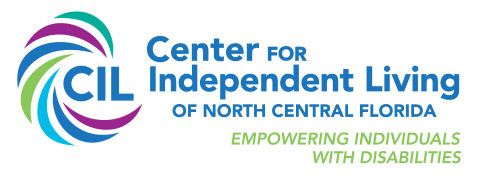Dear Friends of the Center for Independent Living of North Central Florida (CILNCF),
The CILNCF recently held its annual staff luncheon, during which we reviewed the previous year’s accomplishments. Last year’s accomplishments included 15 wheelchair ramps built, 2,200 Sign Language Interpreting assignments completed, nearly 2,000 ADA Paratransit Applications processed, a 100% graduation rate among high school seniors enrolled in our youth program, over 100 vocational evaluations being conducted, the Employment Program helped more than 30 consumers find work, over 2,000 consumers received assistive technology equipment and 12 consumers were transitioned out of nursing homes and back into the community!
Our record of producing such outcomes for the past 30 years, has deservedly made the Center for Independent Living of North Central Florida the area’s leading disAbility Resource Center. So as we enter this holiday season and prepare to begin our 31st year of assisting people with disabilities, our Board, Staff and Consumers are together launching our first ever “End of the Year Campaign Drive”. We do so in the hope of raising awareness as well as much needed support for our program that builds wheelchair ramps free-of-charge for people who need one, but who cannot afford to have one built.
In 2011, the CILNCF served over 4,000 individuals with disabilities. As described above, we were able to build 15 wheelchair ramps, however that was from a waiting list of more than 100. As we go into the new program year, we are reaching out to the community and asking for your support to help us build even more ramps in 2012, such as the ramp we built for Diana.

Diana contacted one of our Consumer Specialists this past May, explaining that she was in dire need of a wheelchair ramp. For over two years, family members and friends had to literally help pull her up and down steps, just to get in and out of her own home. Imagine not being able to come and go from your own home as you please, being so dependent on others. Through our partnership with Christians Concerned for the Community, the CILNCF helped Diana receive a newly build ramp, leading to a new outlook on a more independent life.
This is one small example of how the CILNCF helps individuals with disabilities with limited financial means and opportunities. Ramps are built at no cost to the recipients and your gift will have significant impact in the lives of our consumers. 100% of every dollar donated to this endeavor will be used towards the expenses related to building a ramp, such as purchasing supplies to working with volunteers or contractors.
One small gift from you will make a big difference in the lives of people with disabilities, especially during the holidays. If you would like to make a tax deductable donation to our wheelchair ramp building program, please make your donation payable to:
The Center for Independent Living of North Central Florida and mail us at:
Center for Independent Living of North Central Florida
(CILNCF)
222 SW 36th Terrace
Gainesville, FL 32607
Thank you for your time and support! We will report back to you on the success of our campaign and please don’t hesitate to call or email with any questions.
Sincerely,
William

William D. Kennedy Executive Director






 The Center for Independent Living’s 2011 UFCC # is 3025
The Center for Independent Living’s 2011 UFCC # is 3025 





 Described as “one of the most exciting ways to make a difference in Marion County”,
Described as “one of the most exciting ways to make a difference in Marion County”,